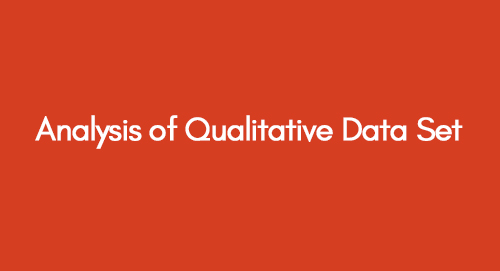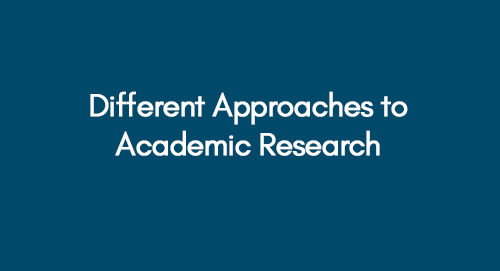
A Sociological Approach to Religion and Belief
July 6, 2022
Analysis of Qualitative Data Set
July 9, 2022Academic research has many ways to explore things, like studying history or doing experiments. Each approach is like a different path to understanding things better, making research exciting and diverse.
This report analyses the different research approaches that are available to researchers to conduct their studies effectively and credibly. The report focuses on discussing the different approaches that are available to a researcher and discusses the advantages and disadvantages of using a particular approach. Furthermore, the report sheds light on research techniques that the researcher can use.
Data Collection Method for Academic Research
Data collection is the process of gathering and measuring data required to perform a specific research keeping in view the variables under discussion. The data collection process explains the data that was collected in this research (Creswell, 2017). It also describes different means of selecting the organizations for the data collection. There are two main procedures to collect data for research. These methods are, primary and secondary. Primary data is the data that is collected by the researcher himself which is why it is sometimes referred to as raw data. The purpose of collecting primary data is to conclude the issue that is being researched. The essential benefit of obtaining data through primary sources is that through this method the researchers can provide a possible conclusion.
The researcher can use surveys and interviews to obtain this data for the research. However, several disadvantages are associated with using primary research methods. The most blatant issue is that the results can depict personal biases that can alter the outcome. The design can be flawed and produce inaccurate results if the researchers do not conduct the research diligently.
Learn What are the Advantages of Secondary Method in Research
The sources used in secondary data are previous researches that have been conducted on similar topics, journals, articles, and government papers. Secondary data helps the researcher discover if there are any research gaps in the literature, this is because the researcher analyses the data in great depth (Merriam and Tisdell, 2015). The advantage of using the second method is that it is easily accessible to the researchers.
Furthermore, technological advancements have made data access much easier than before, thereby increasing the popularity of the use of secondary data collection (Johnston, 2017). However, there are disadvantages to using this approach while conducting research. The most prominent one is that the data is already acquired and analyzed according to the writer’s perspective. The data available can contain personal biases and there may be certain perspectives missing from the literature. Upon this analysis, the researchers must analyze the research questions of the study and the aim of the research, to use the most accurate approach that will produce accurate results. If this is not done, the researcher can jeopardize the entire research by choosing the incorrect approach and producing inaccurate results.
Techniques Employed for Academic Research
It is important to use the correct research techniques while conducting research. To do so, researchers opt-in to choosing different research techniques by seeking help from qualitative and quantitative research approaches. The basic goal of the research is to find answers to questions by applying systematic techniques and examining the results. To do so it is important to use the correct research techniques (Lee, 2017). The amount of flexibility is the biggest contrast between quantitative and qualitative approaches. Quantitative methods are usually very strident. Researchers formulate the same questions for all participants in the same sequence for objective approaches like surveys and questionnaires. This provides a definite conclusion and is useful in collecting data for statistics. Typically, qualitative methods are more flexible, which means that the interaction between the investigator and the study participant is more spontaneous and more adapted. This is a result of open-ended questions in interviews. Due to this, the researchers can obtain a different perspective or a different angle to research. The merits of the research techniques strictly depend on the type of research that is being conducted.
For instance, sampling methods are divided into two categories; probability sampling and non-probability sampling. Probability sampling is used for statistical purposes in various researches using a quantitative approach, on the other hand; non-probability is preferred in conducting qualitative research (Taherdoost, 2016). These groupings are then additionally divided into different types depending on the target audience, sample size, and research scope (Etikan et al., 2016).
Discussions on reliability and validity and objectivity are pervasive in quantitative analysis but there is a far fewer focus and examination paid to these basic elements of qualitative research (Hartas, 2015). The researchers need to understand that qualitative work depends on credibility, while quantitative analysis depends on reliability. To produce credible research, the researcher, must maintain integrity and objectivity. The qualitative researcher must explain how reliability and credibility are ensured and verified in the research methods, in the collected data (Bryman, 2017).
To determine which research technique to follow, it is important to decipher the type of research that is being conducted. Qualitative methods for research are generally not aimed at generating rules and "laws" on the way the real world works. The objective of qualitative research is mainly to study how people feel, react and deal with real problems, taking perceptual human behavior into account (Gaus, 2017). The quantitative research approach is applied when the data collection requires quantifiable data and variables (Bryman, 2017). Mostly, this approach is applied when carrying out primary research. There is sometimes an over-distinction between the different types of the research methodology employed by researchers. Due to this researchers have resorted to mixing these methods in modern research (Edson et al., 2016).
Importance of Ethical Considerations in Planning and Conducting Academic Research
During the planning process and conducting academic research, it is pertinent that the researcher adheres to ethical considerations diligently. There are several considerations that the researchers need to keep in mind. One of the utmost important issues is to maintain confidentiality throughout the research (Birley and Moreland, 2014). This is crucial while carrying out any research and ensures that the results of the study are accurate and are not influenced by any personal biases of the researcher or the participants involved. Furthermore, researchers need to keep in mind several ethical issues that may arise during the research. While conducting research, the researchers need to abide by the code of ethics. One of these issues is obtaining the participant's consent. Consent involves the process whereby an individual is given a free choice to engage in a study or not (Birley and Moreland, 2014). The researcher’s job is to insure that participants recognize the goals and objectives of the project, the dangers associated, and the demands placed on them. Furthermore, the researchers need to ensure that the consent of the participants is being obtained voluntarily. Voluntary consent concerns the ability of every person to practice their free will. The freedom of option must be available to the participants, without arbitrary interference, deception, manipulation, intimidation, or other kinds of exploitation (Ponterotto, 2010). Secondly, the researchers may need to ensure that the information is being passed on to the participants of the research accurately (Birley and Moreland, 2014). The information needs to be completely understood by the participants that are being engaged in the research. In some research, the researchers also have to make sure that the participants can participate in the research (Goodman et al., 2011). The researchers must safeguard the participants that are involved in the research. This includes the age and mental state of the participants involved. Capacity is the ability of an individual to gather information and preserve it. The ability to analyze the knowledge provided and to make a decision based on this analysis is important for the capacity aspect (Goodman et al., 2011). Based on the ability of the individual to obtain, maintain and assess information, they are considered competent or incompetent.
Conclusion
The purpose of this report was to present multiple research approaches and techniques that are available to researchers to conduct research. The report systematically identified and analyzed the different methods that a researcher can use. The report discussed the advantages and disadvantages of the primary and secondary approaches and the importance of identifying the research questions and the aim of the research to determine which approach to use. The report then discussed qualitative and quantitative approaches in regards to the different techniques that the researchers can use to gather and analyze the data. The report also emphasized the notion of credibility, reliability, and objectivity in research. Lastly, the report identified and discussed the different ethical considerations that a researcher needs to be mindful of while conducting research.
References
Birley, G. and Moreland, N., 2014. A practical guide to academic research. Routledge.
Bryman, A., 2017. Quantitative and qualitative research: further reflections on their integration. In Mixing methods: Qualitative and quantitative research (pp. 57-78). Routledge.
Creswell, J.W. and Creswell, J.D., 2017. Research design: Qualitative, quantitative, and mixed methods approaches. Sage publications.
Edson, M.C., Henning, P.B. and Sankaran, S. eds., 2016. A guide to systems research: Philosophy, processes and practice (Vol. 10). Springer.
Etikan, I., Alkassim, R. and Abubakar, S., 2016. Comparision of snowball sampling and sequential sampling technique. Biometrics and Biostatistics International Journal, 3(1), p.55.
Gaus, N., 2017. Selecting research approaches and research designs: A reflective essay. Qualitative Research Journal.
Goodman, C., Baron, N.L., Machen, I., Stevenson, E., Evans, C., Davies, S.L. and Iliffe, S., 2011. Culture, consent, costs and care homes: enabling older people with dementia to participate in research. Aging & mental health, 15(4), pp.475-481.
Hartas, D. ed., 2015. Educational research and inquiry: Qualitative and quantitative approaches. Bloomsbury Publishing.
Johnston, M.P., 2017. Secondary data analysis: A method of which the time has come. Qualitative and quantitative methods in libraries, 3(3), pp.619-626.
Lee, A.S., 2017. Philosophy and method: making interpretive research interpretive. In The Routledge Companion to Management Information Systems (pp. 30-46). Routledge.
Merriam, S.B. and Tisdell, E.J., 2015. Qualitative research: A guide to design and implementation. John Wiley & Sons.
Ponterotto, J.G., 2010. Qualitative research in multicultural psychology: Philosophical underpinnings, popular approaches, and ethical considerations. Cultural Diversity and Ethnic Minority Psychology, 16(4), p.581.
Get 3+ Free Dissertation Topics within 24 hours?



























